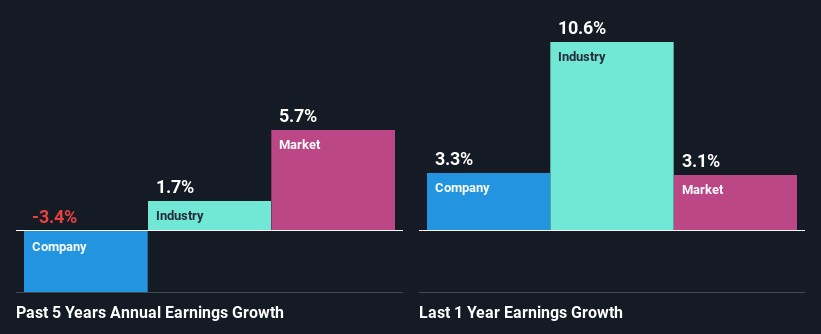Tenfu (Cayman) Holdings Company Limited's (HKG:6868) Stock Has Shown Weakness Lately But Financial Prospects Look Decent: Is The Market Wrong?

Tenfu (Cayman) Holdings (HKG:6868) has had a rough three months with its share price down 12%. However, the company's fundamentals look pretty decent, and long-term financials are usually aligned with future market price movements. Specifically, we decided to study Tenfu (Cayman) Holdings' ROE in this article.
Return on equity or ROE is an important factor to be considered by a shareholder because it tells them how effectively their capital is being reinvested. In short, ROE shows the profit each dollar generates with respect to its shareholder investments.
View our latest analysis for Tenfu (Cayman) Holdings
How Do You Calculate Return On Equity?
ROE can be calculated by using the formula:
Return on Equity = Net Profit (from continuing operations) ÷ Shareholders' Equity
So, based on the above formula, the ROE for Tenfu (Cayman) Holdings is:
12% = CN¥213m ÷ CN¥1.8b (Based on the trailing twelve months to December 2023).
The 'return' is the income the business earned over the last year. Another way to think of that is that for every HK$1 worth of equity, the company was able to earn HK$0.12 in profit.
What Is The Relationship Between ROE And Earnings Growth?
So far, we've learned that ROE is a measure of a company's profitability. Based on how much of its profits the company chooses to reinvest or "retain", we are then able to evaluate a company's future ability to generate profits. Generally speaking, other things being equal, firms with a high return on equity and profit retention, have a higher growth rate than firms that don’t share these attributes.
A Side By Side comparison of Tenfu (Cayman) Holdings' Earnings Growth And 12% ROE
To start with, Tenfu (Cayman) Holdings' ROE looks acceptable. Further, the company's ROE compares quite favorably to the industry average of 9.2%. For this reason, Tenfu (Cayman) Holdings' five year net income decline of 3.4% raises the question as to why the high ROE didn't translate into earnings growth. We reckon that there could be some other factors at play here that are preventing the company's growth. Such as, the company pays out a huge portion of its earnings as dividends, or is faced with competitive pressures.
However, when we compared Tenfu (Cayman) Holdings' growth with the industry we found that while the company's earnings have been shrinking, the industry has seen an earnings growth of 1.7% in the same period. This is quite worrisome.

Earnings growth is an important metric to consider when valuing a stock. What investors need to determine next is if the expected earnings growth, or the lack of it, is already built into the share price. Doing so will help them establish if the stock's future looks promising or ominous. If you're wondering about Tenfu (Cayman) Holdings''s valuation, check out this gauge of its price-to-earnings ratio, as compared to its industry.
Is Tenfu (Cayman) Holdings Using Its Retained Earnings Effectively?
Tenfu (Cayman) Holdings has a high three-year median payout ratio of 78% (that is, it is retaining 22% of its profits). This suggests that the company is paying most of its profits as dividends to its shareholders. This goes some way in explaining why its earnings have been shrinking. The business is only left with a small pool of capital to reinvest - A vicious cycle that doesn't benefit the company in the long-run. Our risks dashboard should have the 2 risks we have identified for Tenfu (Cayman) Holdings.
Moreover, Tenfu (Cayman) Holdings has been paying dividends for at least ten years or more suggesting that management must have perceived that the shareholders prefer dividends over earnings growth.
Conclusion
Overall, we feel that Tenfu (Cayman) Holdings certainly does have some positive factors to consider. Yet, the low earnings growth is a bit concerning, especially given that the company has a high rate of return. Investors could have benefitted from the high ROE, had the company been reinvesting more of its earnings. As discussed earlier, the company is retaining a small portion of its profits. Until now, we have only just grazed the surface of the company's past performance by looking at the company's fundamentals. To gain further insights into Tenfu (Cayman) Holdings' past profit growth, check out this visualization of past earnings, revenue and cash flows.
Valuation is complex, but we're here to simplify it.
Discover if Tenfu (Cayman) Holdings might be undervalued or overvalued with our detailed analysis, featuring fair value estimates, potential risks, dividends, insider trades, and its financial condition.
Access Free AnalysisHave feedback on this article? Concerned about the content? Get in touch with us directly. Alternatively, email editorial-team (at) simplywallst.com.
This article by Simply Wall St is general in nature. We provide commentary based on historical data and analyst forecasts only using an unbiased methodology and our articles are not intended to be financial advice. It does not constitute a recommendation to buy or sell any stock, and does not take account of your objectives, or your financial situation. We aim to bring you long-term focused analysis driven by fundamental data. Note that our analysis may not factor in the latest price-sensitive company announcements or qualitative material. Simply Wall St has no position in any stocks mentioned.
About SEHK:6868
Tenfu (Cayman) Holdings
Operates as a traditional Chinese tea-product company.
Excellent balance sheet second-rate dividend payer.
Market Insights
Community Narratives



